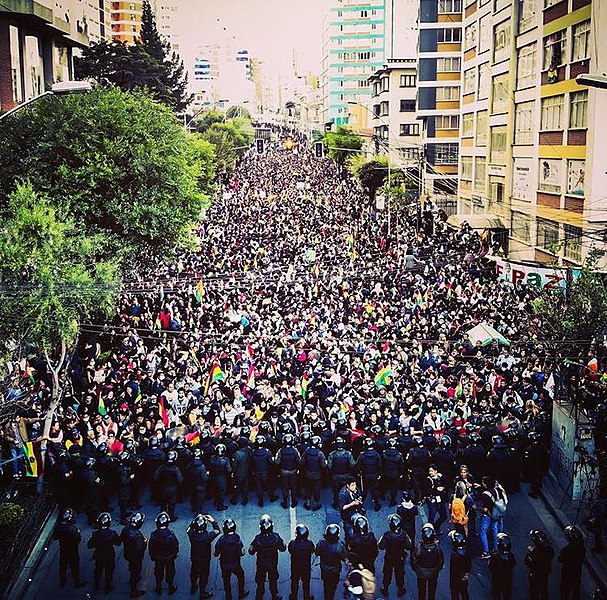Political turmoil has plagued the country of Bolivia in a striking showing of yet another case of regime unrest in Latin America. The national elections held on October 20th caused quite the stir among citizens due to the alleged assertion that the incumbent, Evo Morales, had rigged the election. Morales was the first leader from an indigenous community to take office. It was reported that Morales had amassed 47.08% of the vote while his opponent, Carlos Mesa, had only received 36.51% of the vote. Morales’s percentage was enough to win the election without having to have a run-off second-round vote. This would have been his fourth term. But in the days that followed, international policy groups conducted research and found that data manipulation and forged records had tinted the election in favor of Morales. Suspicions arises when a pause in result transmission stopped for 24 hours in the middle of the vote count. After this pause the results showed Morales leading way ahead of Mesa. Right before they have been relativity neck and neck so this change raised eyebrows.This caused massive uproar among citizens and prompted masses of people to join in protests in the cities.
A few days after the protests had started, Mesa encouraged his supports to step up protests and demand a second round of voting. In early November police officers from three cities in Bolivia joined the opposition movement and began protesting in the streets with the civilians. Homes of prominent political figures where attacked after an international organization reported that it had indeed found irregularities in the election.
On November 12th, President Morales resigned and looked to seek political asylum elsewhere. In essence, the military forced him to step down and according to US presidential candidate Bernie Sanders, “when the military intervenes . . . that’s called a ‘coup.” (Economic Times) He fled to Mexico where he was granted such position. Deputy speaker, Jeanine Anez, took post as interim president but called for new elections to be held.
Anez’s party had received just four percent of the total vote during the October 20th election. Shortly after Morales and his vice president resigned the entire line of succession resigned as well.
When discussing the case of President Morales, it is important to note his past actions and decisions that led to widespread protests. He had attempted to extend his term limit in 2016 by pushing for a referendum on term limits. This measure did not pass, however. But in late 2017 the Supreme Tribunal of Justice, the highest court of law in the country, ruled that all public political offices would have no term limits. This caused uproar as it went against what was established for terms in the constitution.
Recently, Morales’s party, MAS, announced that neither Morales nor his vice president would be running on behalf of MAS in the new elections. Senior MAS member, Henry Cabrera, stated, “we are going to participate in the elections and we are going to do it with young candidates, especially for president and vice-president,”. (Economic Times)
Whether the majority of Bolivians liked Morales or not, interim president, Jeanine Anez, has been causing trouble of her own. She has been vehemently described as feverishly Christian and racist. Many say that under her leadership, Bolivia is heading towards a far-right movement. She has made a numbers of claims and decrees that have activity repressed the MAS. She exempted the state’s military from being prosecuted for using force. She also stated that Morales party, MAS, may not be allowed to participate in future elections. This is problematic for two reasons, the first being it is undemocratic and the second being that MAS is objectively the largest party in Bolivia. Not to mention that there has been growing anti-indigenous racism ever since Anez assumed position in office. For indigenous communities in Bolivia, Morales was a champion and they took pride in claiming him. Unfortunately, after he stepped down hate turned on the native communities and “multiple groups have publicly burned the indigenous Wiphala flag, and video shows police in Santa Cruz cutting the Wiphala, which became an official national symbol under Morales, from their uniforms.” (Jacobin) This is deeply concerning because it undermines democracy in Bolivia. If democracy starts to fall it could escalate the political situation even more in a backwards direction.
Surprisingly, Morales has been relatively cooperative with the whole situation. Right after the intuit results came out he stated that he was fine with a second round vote being conducted. It should be noted that he also stepped down fairly quickly and in a manner that wasn’t too aggressive in response to the people’s wishes. Whether this speaks to his alleged guiltiness is another question to ponder.
Anez has yet to announce when new elections will take place. Such elections will be instrumental in deciding which direction the country will go in. Whatever the outcome it begs the question of whether democracy as we know it, is at risk in Bolivia.
Works Cited:
“Bolivia’s Election Turmoil: a Timeline – How It All Started.” The Economic Times, economictimes.indiatimes.com/news/international/world-news/bolivias-election-turmoil-a-timeline/fresh-start/slideshow/72034192.cms.
Hetland, Gabriel, et al. “Bolivia Is Descending Into a Full-Blown Far-Right Military Dictatorship.” Jacobin, www.jacobinmag.com/2019/11/bolivia-coup-evo-morales-mas-jeanine-anez.

